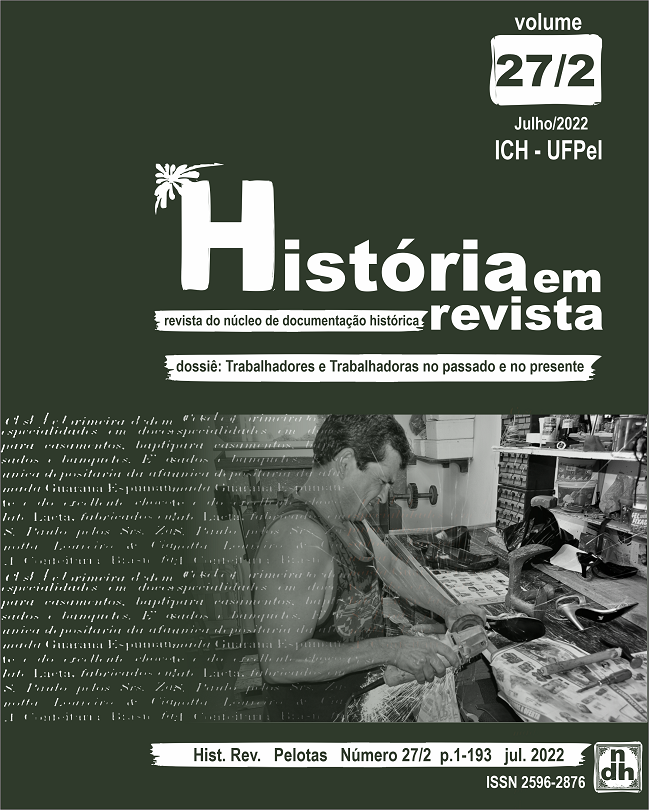SAÚDE E GÊNERO: O ENFRENTAMENTO CITADÍNEO ÀS EPIDEMIAS NA ERA MODERNA LUSITANA E A REPRESENTAÇÃO DO CORPO DA MULHER
Resumo
Health and gender: the citizen address in Portugal to epidemics in the modern Lusitanian era and the representation of the woman’s body
No intuito de analisar como as epidemias dos séculos XVI e XVII assolaram o Portugal modernista, elencou-se como ferramenta teórica e metodológica os estudos foucaultianos sob a grade analítica da norma e do controle. À vista disso, no enfretamento as epidemias foram postas em práticas medidas de segurança pública visando cerceamento à circulação de indivíduos entre e nas cidades. Em concomitância, o estabelecimento das Santa Casas de Misericórdia almejava a salvação do corpo e da alma, ou seja, os cuidados com a saúde justapostos a fé católica professada pela sociedade e expressa nessas instituições. Nesse processo de cura e de entendimento da doença e do doente, debateu-se os efeitos das pestes no corpo, sobretudo na mulher, alvo de estudos no período. Esse interesse corroborava a tese de uma distinção entre homens e mulheres, mas não pela diferença em si, e sim a partir do aspecto evolutivo. Subentendia-se que a mulher estaria em um estágio anterior à evolução humana, sendo o homem branco o topo da cadeia evolutiva natural – física e cognitivamente. Ao que concerne as epidemias, atualmente, essas questões reverberam de outros modos no presente, em que o cuidado com a fronteira e o embate as epidemias ainda se fazem necessários, especialmente em tempos de Covid-19.
Palavras-chave: Controle social; Corpo feminino; Epidemias.
Abstract: In order to analyze how the epidemics of the 16th and 17th centuries plagued modernist Portugal, Foucaultian studies were listed as a theoretical and methodological tool under the analytical framework of norm and control. Therefore, in the fight against epidemics, public security measures were put in place to curb the movement of individuals between and in cities. Concomitantly, the implantation of the Santas Casas de Misericórdia aims at the salvation of body and soul, that is, health care juxtaposed with the Catholic faith professed by society and expressed in these institutions. In this process of healing and understanding the disease and the patient, the effects of pests on the body were discussed, especially on women, who were the target of studies in the period. This interest corroborated the thesis of a distinction between men and women, but not for the difference itself, but for the evolutionary aspect. It was understood that the woman would be in a stage prior to human evolution, with the white man being the top of the natural evolutionary chain - physically and cognitively. With regard to epidemics, these issues have repercussions in other ways today, in which care with the border and the fight against epidemics are still necessary, especially in Covid-19.
Keywords: Social control; Feminine body; Epidemics.
Downloads
Autores que publicam nesta revista concordam com os seguintes termos:
1. Autores mantém os direitos autorais e concedem à revista o direito de primeira publicação, com o trabalho simultaneamente licenciado sob a Licença Creative Commons Attribution que permite o compartilhamento do trabalho com reconhecimento da autoria e publicação inicial nesta revista.
2. Autores têm autorização para assumir contratos adicionais separadamente, para distribuição não-exclusiva da versão do trabalho publicada nesta revista (ex.: publicar em repositório institucional ou como capítulo de livro), com reconhecimento de autoria e publicação inicial nesta revista.
3. Autores têm permissão e são estimulados a publicar e distribuir seu trabalho online (ex.: em repositórios institucionais ou na sua página pessoal) a qualquer ponto antes ou durante o processo editorial, já que isso pode gerar alterações produtivas, bem como aumentar o impacto e a citação do trabalho publicado.










